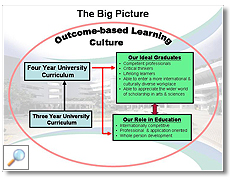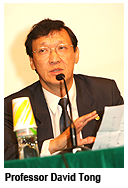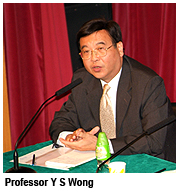Charting the future with cautious optimism
Professor H K Chang, University President, reported on key issues that the University confronted in the past year, outlined activities that lie ahead and listened to staff concerns about University development in a "University Development Forum" held on 24 May in the Wei Hing Theatre.
Professor Chang opened the forum with optimistic remarks: “This year, we’re in better spirits and things are starting to look up.” CityU has withstood the threat of four budget cuts, including a 10% across-the-board cut and a 20% cut due to phasing out of 13 of the 19 Associate Degree (AD) programmes within four years and cessation of University Grants Committee (UGC) funding of all taught postgraduate programmes.
A healthy financial position
“History shows that the most important asset of this University is staff's dedication and people's cooperation,” Professor Chang said. Instead of devising policies which would shatter the spirit and dedication that created CityU, the University opted for measures that increased efficiency and productivity. For instance, Professor Chang said, the University proactively reduced the budget by 10% one year ahead of the anticipated cut, introduced two voluntary departure schemes to lighten the
burden of staffing costs and froze the annual salary increment. “Finally and most importantly, our staff pull together—teaching, academic and support staff—to run the self-financing programmes that generated revenue to make up for the shortage.Today, I’m happy to report that we are in a fairly healthy financial position,” he said.However, the President also cautioned that due to the phasing out of the AD programmes, the University has not seen the end of cutbacks. A deficit is predicted towards the middle of the next triennium. “We would like to maintain the same level of funding and stability in the next triennium as in 2004-05, so the University will have to dip into reserves to make a flat budget and to maintain the quality of education and other programmes,” he said. “We are largely out of danger, just like coming out of an intensive care unit. But that doesn’t mean we need not worry.”
CityU’s role clearly defined and embraced
Professor Chang also told staff at the forum that the role statement issue that beset the University for the last six months is close to an end. He recapped the key messages in the role statement and recounted the University’s dealings with UGC in the last year. Professor Chang reaffirmed that the role statement CityU received from UGC harmonized with the mission laid out in the University’s Strategic Plan in 2003 which emphasizes aligning the University’s activities along the axis of professional education and applied research. CityU has fully embraced the role statement.
He also reported that a revised mission statement drafted by the Council’s Strategic Development Committee to reflect the University’s positioning was discussed at the Senate meeting before the forum. According to the President, the UGC was pleased with the University’s move to update the mission statement and to use new and more appropriate benchmark institutions.
Professor Chang mentioned a delegation's recent visit to universities in northwestern
New challenges in teaching and learning
In response to the UGC’s emphasis on transforming education in local institutions into outcome-based learning processes, the University recently appointed a Dean of Undergraduate Education and a Dean of Student Learning.
In the years to come, the University faces the challenge of preparing and realizing the goal of a four-year curriculum. Professor Chang believes that the UGC does not require CityU merely to extend the curriculum by one year, but to achieve an integrated learning experience for students. “This is an opportunity for us to redefine our character and come up with innovative new programmes,” he said. “The UGC expects us to demonstrate that we can meet the needs of students and of society in the next 10 to 15 years. We need to ensure the compatibility of our role in education as prescribed by the UGC and our own descriptions of the ideal graduate.”
Taking pride in applied research achievements
Professor Chang also recounted CityU’s achievements in applied research, giving as examples its business incubations, patents and consultancy services. “CityU is one of the most active incubators of start-ups among local universities,” he said. “Currently, there are over 30 active companies under the umbrella of CityU Enterprises Ltd, of which five to six are profitable and very promising. All of them came from home-grown technology and the key personnel is our staff.” With support from the Innovation & Technology Fund and other sources, which amounted to HK$63.7 million between 2001 and 2004 and a turnover of HK$140 million from over 2,150 consultancy projects undertaken in the same period, the results readily demonstrate that the University’s achievements in applied research are recognized. Between 2002 and 2004, over 80% of the thesis topics of the 484 MPhil and PhD degrees awarded were in the category of applied research.
Looking ahead
In addition to preparing for the four-year curriculum, shaping an outcome-based learning culture and revising the mission statement, Professor Chang told staff at the forum that internationalization, the expansion of activities on the mainland, resolving the issue of an inadequate amount of teaching space and upholding the quality of self-financing teaching activities are key areas for future development.
In line with the UGC’s call for universities to deepen their internationalization strategies, the University established the Committee on Internationalization Strategy and set up an International and Non-local Students Office under the aegis of Student Development Services to cater to the needs of students from outside
The future of
While the Community College of City University building and the Creative Media Centre are in the pipeline, the University will make a request for two more student hostels in the capital projects proposal to be submitted to the UGC, in addition to seeking Government approval for proposals for two academic buildings near the open carpark and across Cornwall Street.
Staff voices
At the Q & A session, staff raised a number of questions and concerns, mainly about the University’s financial situation and teaching and learning.
One staff member asked if the University would return to the staff the 6% pay cut of the past two years. In response to this, Professor Wong reminded the colleague not to overlook the long-term budget situation. He pointed out that our budget situation is better because this is only the first year in which College funding was suspended. Starting from next year, particularly in 2007 and 2008, the University will suffer a significant deficit. “This structural deficit could be HK$100 million, or more, a year and last for ten years. We should reserve the income for the future,” Professor Wong
said.Professor Chang also reminded colleagues that the HK$200 million, to a large extent, could only make up the cuts from the taught postgraduate programmes and the AD programmes. He urged CityU colleagues to be patient, because using the money for salary restoration would force the University to squeeze some educational activities that serve students. He said, “Our financial situation is just healthy enough to get out of the ICU. If we run off to play basketball now, we’re going back to the ICU pretty quickly.” He emphasized that we can barely make ends meet and need to dip into reserves in the next two years. He hoped that our colleagues don’t think that the University has some mysterious surplus.
"With a healthier financial situation, can the University allow the departments to recruit quality staff?" one staff member questioned. To this, Professor Wong said that, in the past two years, the University has never stopped recruiting good people. “The University should continue to grow despite financial difficulty. So we continue to recruit good people and reward performance. That’s Management's belief,” he said.
In response to concerns about the ideal graduate CityU portrays, graduate employment and student well-being, Professor Chang commented that outcome-based learning will be significant since it highlights what students learn, rather than what the teacher has taught. With this mode of teaching, teachers will have more responsibility to motivate students and influence their attitudes. As for graduates' career prospects, Professor Chang pointed out that the University’s image is crucial. “Most employers,” he said, “including ourselves, look at the reputation of the university from which the student graduated.” He stressed that CityU’s good image must be maintained and he encouraged staff to work harder to provide students with whole person development and quality academic education.
“Our future really is in our hands,” Professor Chang said. “If we want to do well for the University, for the students and for ourselves, we need to work together as we’ve done in the past.”







